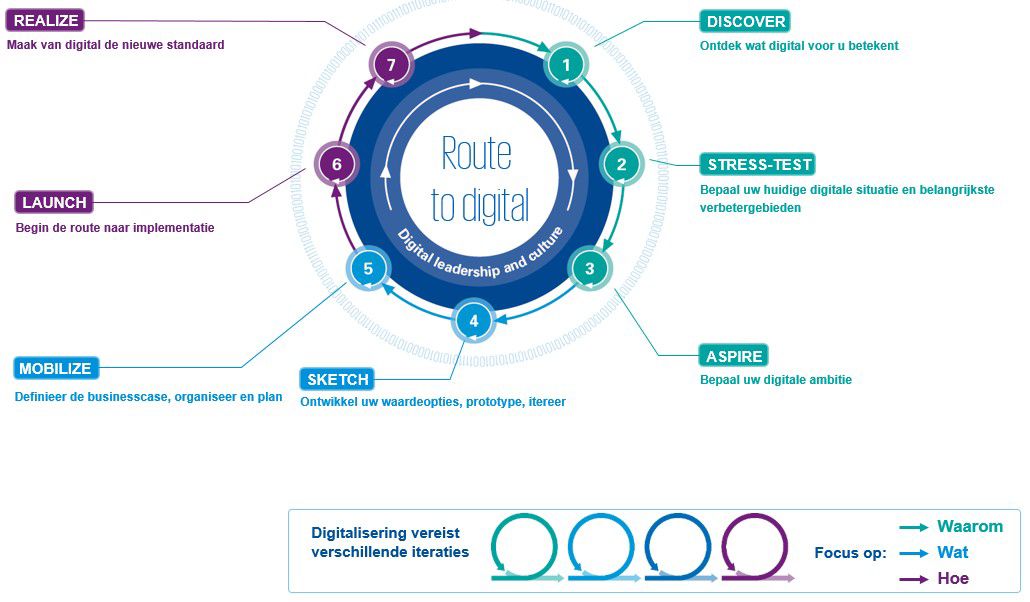Related services
Digital disruption in a changing world
“Digital is not a thing, but is simply a word that describes our world today. Advancements in technology have blurred the lines between physical and virtual, creating an emergence of digital disruptors that provide new pathways for organizations to create value” – KPMG.
Digital opportunities
Technological changes in today's world call for companies to operate differently than they are used to. These changes prompt questions such as:
- How can your business meet the constantly changing wishes of its customers?
- How can you effectively respond to new markets, new competitors and new business models?
- How can you make sure you are always capable of delivering an excellent customer experience?
- How can your company create added value for your stakeholders?
The opportunities offered by Digital Transformation are enormous. However, firms need to adapt quickly and put people at the centre of the transformation in order to utilise those opportunities to the full.
We offer you insight into those opportunities and can help you successfully implement the necessary changes. In partnership with you, we will formulate a strategy based on your customers’ wishes. We will help you implement the strategy and at the same time help your organisation to adapt to the new way of working. In this way, you will not only be responding to what the future brings, you will be shaping the future.
Supporting you in end-to-end transformations
Our Route to Digital approach will help you define your financial ambitions, business and operating model in order to integrate digitisation into your business.

Our approach consists of seven phases in which we use agile principles and an iterative approach in order to deliver a successful result that ties in closely with your company's vision. KPMG believes in a human approach to Digital and will stand shoulder-to-shoulder with your team. In concrete terms, we will work with you to formulate a digital strategy by elaborating the seven steps based on the following questions:
Discover
- What is the ‘potential’ we can achieve with Digital?
- How can start-ups and insight centres inspire us?
- What is the reason for change?
Stress-test
- How do we open ourselves to disruption and where do the opportunities lie?
- What impact is Digital having on our business and our operating model, and specifically on our customers and our employees?
- How digitally mature is our organisation?
Aspire
- Which future digital blueprint will deliver our corporate vision and strategy?
Sketch
- What promising digital value cases are there in our context?
- Is implementing these ideas achievable and desirable?
- Have you made allowances for unintended consequences and associated risks?
Mobilize
- Is there a ‘value case’ for the initiatives/value options?
- Have we clearly incorporated Digital into our governance and has communication on this begun?
- How can we initiate an agile transformation in order to change our way of working?
Launch
- How do we strike a balance between short-term profits and long-term objectives whilst retaining flexibility?
- How do we increase visibility and reduce the risks of implementation?
- How can we activate an ecosystem of partners for implementation?
Realize
- How can we achieve digital initiatives and use them to take decisions or implement analyses based on the results?
- How can we integrate agile and ‘continuous improvement’ into the new standard?
- How do we ensure effective communication towards our stakeholders?
There are five success factors in implementing a Digital Transformation
Based on experience, we define the following five areas of focus for a Digital Transformation:
- Transforming an organisation means striking the right balance between ‘why’, ‘how’ and ‘what’,
- Use existing strategy and strengths as building blocks for a successful future,
- Let ‘Digital Leadership’ and ‘Culture’ be an integral part of the transformation,
- Listen to your employees, your most important partners and your end users: Generally, most ideas come from the world around us. A method we apply is based on Design Thinking. Design thinking is a method that is centred around people, by defining problems based on human needs,
- Look forwards from today: develop a clear picture of the industry of the future and define a solid starting point for that future.
Digital integration in your organisation
KPMG offers support for the end-to-end Digital Transformation process in order to integrate Digital into your organisation. We start by formulating a digital strategy, after which we move to the initial phase of implementation within the organisation, with the final phase being the actual implementation and transformation.
Thanks to our broad and in-depth expertise and experience of the different phases of the Digital Transformation, we can develop an appropriate approach that ties in closely with your company’s wishes. KPMG's expertise extends from investigating opportunities for a digital strategy to applying advanced technologies within your existing digital strategy. Because we are already doing this in large organisations, we always have the most up-to-date solutions.

